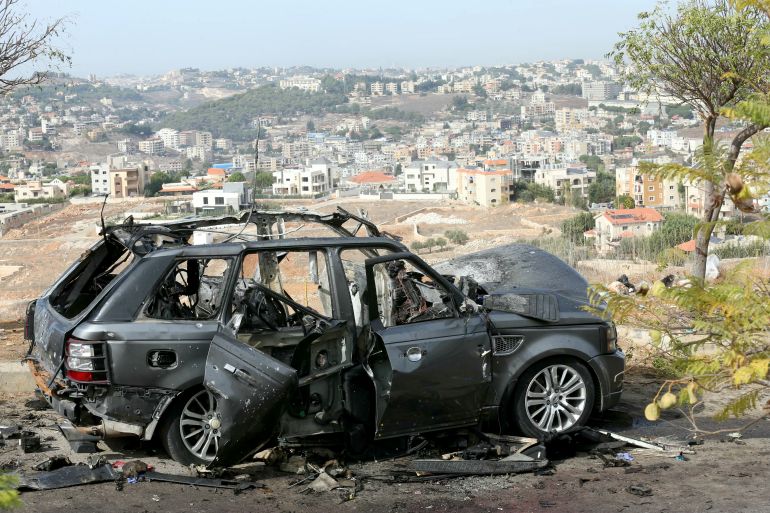Israel kills one in south Lebanon as Bekaa Valley still reels from war
Lebanon’s Health Ministry says a missile hit a car in the southern town of Burj Rahal in Tyre district, the latest in a series of attacks despite ceasefire.

By Caolán Magee
Published On 5 Nov 20255 Nov 2025
Save
Beirut, Lebanon – An Israeli air strike on southern Lebanon has killed one person and wounded another, Lebanon’s Ministry of Public Health says, as Israel ramps up its cross-border attacks in defiance of a ceasefire.
The ministry said in a statement on Wednesday that an “Israeli enemy raid” struck a car in the town of Burj Rahal in the southern district of Tyre.
Recommended Stories
list of 4 itemsend of list
“The attack resulted in the martyrdom of one citizen and the injury of another,” the statement read, without identifying the dead.
Lebanon’s National News Agency said the attack happened near a school, triggering panic among students and prompting parents to rush to collect their children amid scenes of fear and chaos.
Ceasefire under strain
The Israeli military did not immediately comment on the strike, which was the latest in a series of its attacks across southern Lebanon, despite a ceasefire signed on November 27, 2024.
Israeli forces remain deployed in at least five areas of Lebanon’s south as they carry out near-daily air raids that Israel says target Hezbollah fighters and infrastructure.
On Monday, two people were killed and seven wounded in separate attacks in southern Lebanon. A day earlier, Israeli raids in Nabatieh killed four people, according to Lebanon’s Health Ministry.
Inside Lebanon, the continued bombardment has heightened fears of a renewed war, as Israeli and United States officials press the Lebanese government to force Hezbollah to disarm.
Israeli military intelligence has claimed in recent days that Hezbollah is attempting to rebuild its military capabilities. A Hezbollah spokesperson denied reports of expanded military activity or attempts to restore its elite units.
Advertisement
“Israel fabricates stories and claims to justify its attacks,” the spokesperson told Lebanon’s L’Orient Today newspaper on Monday.
Hezbollah was severely weakened after the Israeli escalation in September 2024, which killed its longtime leader, Hassan Nasrallah. Since the November ceasefire, the group has responded to Israeli attacks only once.
Hezbollah officials have repeatedly said the group will not disarm, saying that relinquishing its weapons would leave southern Lebanon exposed to an Israeli invasion.
Baalbek still under fire
Nearly a year after Israel’s wide-scale bombing campaign across Lebanon, residents in the eastern Bekaa Valley say they are still living under persistent Israeli threats.
In Baalbek, a city known for its Roman ruins and considered part of Hezbollah’s heartland, Israeli strikes continue to target what the Israeli military describes as Hezbollah’s “logistical and operational base”.
But many civilians also remain under constant bombardment.
“What is happening now isn’t short of a war. It is a war,” Abu Ali, a resident of Baalbek, told Al Jazeera. “There is so much talk about targeting Baalbek, and this is scaring people away,” added another resident, Ali Chokair.
Much of the Bekaa region remains scarred by last year’s Israeli strikes, leaving one of Lebanon’s poorest areas struggling to rebuild.
Lebanon under pressure to negotiate
Israeli and US officials are pressing for Hezbollah’s disarmament, with US ambassador Tom Barrack urging the armed group to begin a dialogue with Israel.
Israeli Prime Minister Benjamin Netanyahu warned on Sunday that the army would “act as necessary” if Lebanon failed to ensure Hezbollah handed over its weapons.
“We expect the Lebanese government to fulfil its commitment – to disarm Hezbollah – but it is clear we will exercise our right of self-defence under the terms of the ceasefire,” he said.
Lebanese President Joseph Aoun has said the country has “no choice but to negotiate” with Israel to avoid a wider conflict. But many in Baalbek and southern Lebanon oppose any talks that could lead to Hezbollah’s disarmament,
Hussein Osman, who runs a restaurant in Baalbek, refused to flee when the Israeli army ordered residents to leave during last year’s war. Like many Hezbollah supporters, he questions Lebanon’s decision to negotiate with Israel, which is attacking the region almost every day.
“We would support any negotiation that works for the benefit of the resistance,” he said. “But any negotiation that involves disarming the resistance is not accepted … These weapons protect us and allowed us to stay in our homes.”
Advertisement

